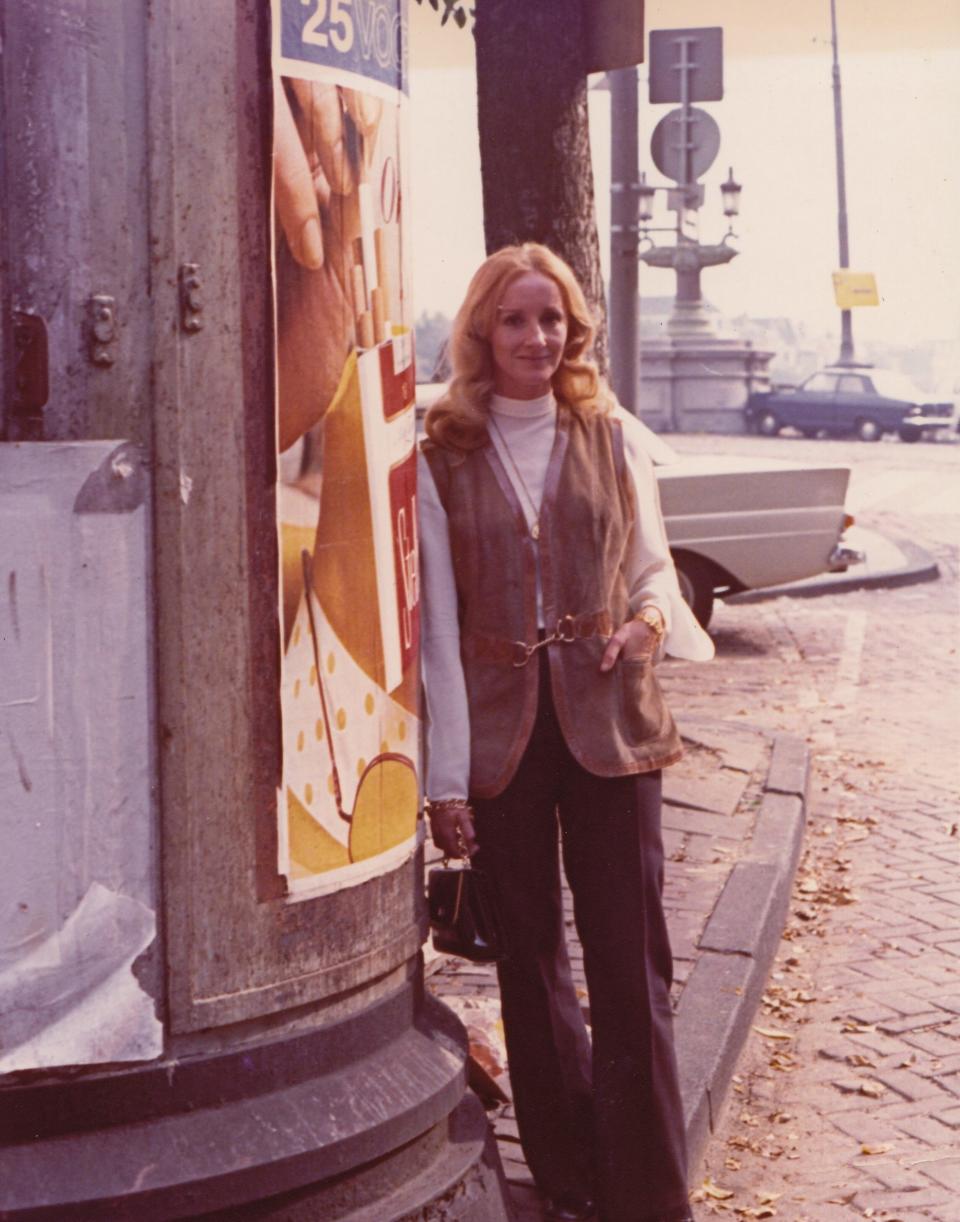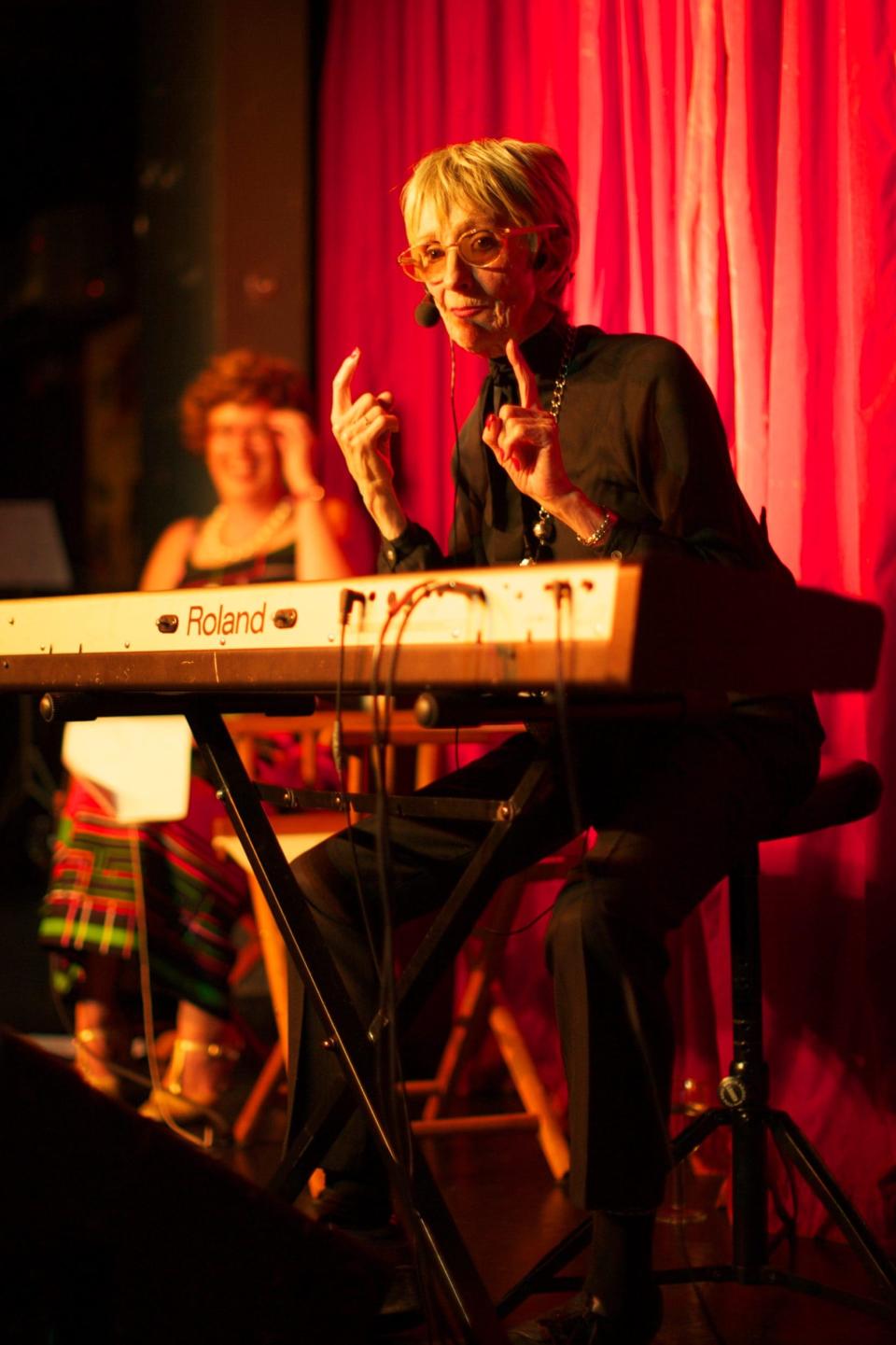Barbara Moore, singer and composer behind the Pick of the Pops theme tune and a host of memorable moments on television – obituary

Barbara Moore, who has died aged 89, was a singer and composer of everything from jazz and pop to choral music, but she remained almost anonymous while having a massive impact on the daily lives of millions.
Her longest-lasting and probably most frequently heard works were two jazzy, brassy radio themes that became the soundtracks to many people’s lives.
Just Like That, her rousing 1970 composition, could hardly have failed to wake up listeners when Terry Wogan began his first, 12-year, run as presenter of BBC Radio 2’s breakfast show two years later. Barbara Moore took up the conductor’s baton to record it with Brass Incorporated.
In the same studio session, the big band performed her new arrangement of At the Sign of the Swinging Cymbal, a 1960 Brian Fahey instrumental, following a commission from the BBC to do “a jazzed-up version using the big orchestra”.
The original had been the theme to Pick of the Pops for five years from 1961, when Alan Freeman suggested it on taking over as presenter of the programme, then featuring current chart hits.
It returned to the Radio 1 show after Barbara Moore vamped up the piece to give it a greater sense of urgency – the “heavy” version, as she described it – and it was soon regarded by the public as Freeman’s personal signature tune. Her arrangement remains to this day in Pick of the Pops as Paul Gambaccini counts down hits from years past on Radio 2.
On television, Barbara Moore’s voice found a worldwide audience in Edwin Astley’s theme for The Saint, starring Roger Moore (no relation) as suave crime-fighter Simon Templar.
She recorded her haunting background vocal, which could easily be mistaken for a musical instrument – similar to jazz “scat” singing but without improvisation – live with an orchestra after driving to Elstree Studios, where she found Roger Moore “leaning laconically against another mic [microphone]”.
Her fee for the 1962 recording was £60, but the royalties rolled in for decades. “In repeats, it helped to bring up my little girl to womanhood,” she said.

She also arranged the vocals for the 1971 Coca-Cola “Hilltop” commercial, I’d Like to Teach the World to Sing, which became a hit in a different version for the New Seekers.
Music was in her blood. She was born Barbara Birkby in Bradford, West Yorkshire, on March 7 1932, the only child of Arthur Birkby, a jazz musician and arranger who worked with Joe Loss – her godfather – and Jack Payne, and Clara Walters, a singer with the dance band leader Geraldo.
At St Paul’s Girls’ School, London, she was taught piano and music theory by Nora Day, who had been a copyist for Gustav Holst, the Planets composer.
She then spent a year with Dartford repertory company before travelling to India and playing the piano at the Taj Mahal hotel, Mumbai (then Bombay).
On returning to Britain, she sang jazz with vocal groups such as the Fraser Hayes Four and the Stargazers, and performed in her own right in the radio show Evergreen (1964) and episodes of the TV series Not Only … But Also (1965), starring Peter Cook and Dudley Moore.

Later, she sang the counterpoint vocal alongside Cook on the title song from the comedy duo’s 1967 film Bedazzled. Her friendship with Moore had begun at the end of the previous decade when he had no piano and she offered him the use of hers.
She was also a backing vocalist on TV shows featuring stars such as Dusty Springfield (1966), as well as in the Ladybirds, whom she joined in 1965.
Two years later, the all-female trio backed Jimi Hendrix singing his first British hit, Hey Joe, on Top of the Pops. Barbara Moore said he was a “bedraggled, skinny-looking lad”, so they took him to the BBC canteen and filled him with shepherd’s pie.
The group also travelled to Vienna in 1967 to back Sandie Shaw performing Puppet on a String in the Eurovision Song Contest final. It became Britain’s first winner, although Barbara Moore reflected: “It was a bit ridiculous, really, being flown out to sing about 16 bars of ‘boop, boop, boops,’ ”
Back home, she had her own name on the front of an album sleeve for the first time when she sang and played piano for A Little Moore Barbara, featuring jazz, film and musical numbers. The following year heralded the start of a new career when EMI, suddenly short of arrangers and conductors because of a flu epidemic, asked her to work on recordings with an 18-year-old folk singer, Deena Webster.
After first getting over the fact that some of the 60 string and horn players recognised her as one of the Ladybirds and assumed she was there to sing, Barbara Moore nervously stepped on to the rostrum in front of them – and the baton promptly fell from her sweaty palm on to the bass drum.
She ploughed on with her “heavy rock” version of Scarborough Fair – and, at the end, the orchestra gave her a standing ovation.
When the Ladybirds sacked her, saying she was becoming “too ambitious”, she performed with the Jackie Lee Singers. She also formed her own Barbara Moore Singers, appearing on BBC TV shows with Glen Campbell (1970), Bobbie Gentry (1970-71) and Mike Yarwood (1972), and on the soundtrack of the film The Ruling Class (1971).

On her own, she was a regular in the radio series Sing it Again (1971), sang the Francis Lai-Hal Shaper composition Warm Summer Rain in Michael Winner’s Olympic marathon runners film The Games (1970), and performed on budget-price albums featuring cover versions of hit singles.
Elton John repaid Barbara Moore for getting him sessions on such sound-alike LPs by hiring her to arrange and conduct the backing vocals for the gospel-style Border Song (1970), one of his early singles.
She said she turned down a job offer to work as an arranger for the American film music composer John Williams in Los Angeles so as to continue bringing up her daughter in Britain.
After hearing her theme tunes for the Freeman and Wogan radio shows, De Wolfe – which had already used her as a vocalist – commissioned Barbara Moore to compose for its music library, a pioneer in licensing stock material for television, films, radio and commercials.

She would be given a checklist of emotions to evoke, played by an orchestra or jazz or rock group, with the stipulation that 12 titles should be recorded in less than nine hours.
The first of these albums, Vocal Shades and Tones (1972), included Steam Heat, giving the vibe of a boat trip along the Amazon, in soaring temperatures and surrounded by mosquitoes, while also being “sexy”. It was later used on television for a strip club scene in a 1975 episode of The Sweeney.
Barbara Moore’s final album, before she moved to a chateau in France, was Bright & Shining (1981). She later returned to Britain to live in Bognor Regis.
Her 1954 marriage to Peter Moore, a musical arranger and composer who wrote the Pearl & Dean theme tune introducing cinema commercials, ended in divorce. She later had a relationship with the jazz trombonist Chris Pyne.
Lindsey, the daughter of her marriage, died in 2006. She is survived by her granddaughter, Clare.
Barbara Moore, born March 7 1932, died August 27 2021

 Yahoo News
Yahoo News 
